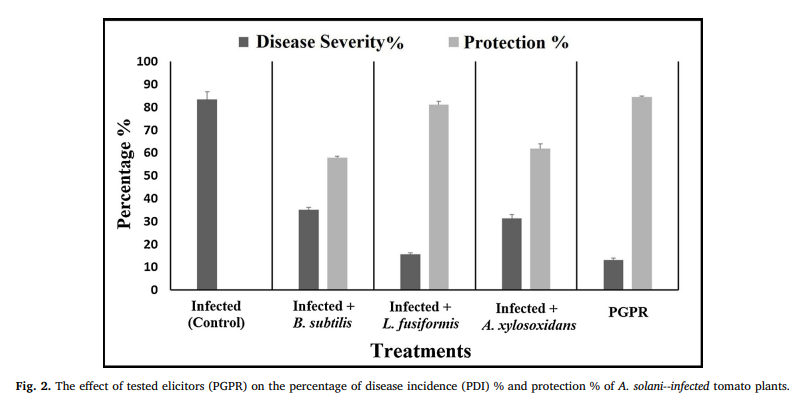
The effective antagonistic potential of plant growth-promoting rhizobacteria against Alternaria solani-causing early blight disease in tomato plant
Tomato plants can be infected by several diseases, among them, the early blight disease, caused by the necrotrophic fungus Alternaria solani is very dangerous. Plant growth promoting rhizobacteria (PGPR) are enhanced the plant growth and suppress plant diseases. The current study was conducted in a pot experiment to investigate the bio-efficacy antagonistic bacterial isolates as either individual or combination against tomato early blight disease. Disease severity and protection percent, morphological indicators as well as yield characters were recorded. In vitro antagonistic activity assay of PGPR against A. solani was estimated. Metabolic indicators of resistance in plant as response to induction of systemic resistance (ISR) were recorded. Our results indicated that, PGPR isolates were reduced the percent disease severity by 13.0 % and recorded highly protection percent by 84.3 %. The beneficial effects of the used elicitors were extended to increase not only the morphological characters (shoot lengths, root lengths and leaflet number/plant) but also the yield characters. All tested elicitors caused the marked significant increases in the photosynthetic pigments. PGPR isolates were exhibited the most potent effect in terms of the contents of chlorophyll a, b and the total chlorophyll (a + b) followed by plants treated with A. xylosoxidans (A3), B. subtilis (B1) and L. fusiformis (L2) in the infected plants, compared to the non-treated infected control. PGPR isolates were increased total phenol (56.15 mg/100 g dry wt.), free proline (1.435 mg/g dry wt.), total protein (1.198 mg/g dry wt.) and the activities of peroxidase (0.705 μg/100 g fresh wt.) and polyphenol oxidase (1.281 μg/100 g fresh wt.). All the tested treatments resulted in increasing the contents of indole acetic acid (IAA), Abscisic Acid (ABA), Salicylic Acid (SA), and Jasmonic acid (JA) compared with those of the infected plants. PGPR isolates’ antifungal activity may be attributed to cell wall disruption of A. solani and the normal conidial development inhibition. Therefore, due to these outstanding properties of PGPR isolates as plant growth promoters and antifungal activity, this study could give insights for solving serious agricultural challenges and particularly in the treatment of A. solani invasion across the tomato plants. © 2020 Elsevier B.V.
